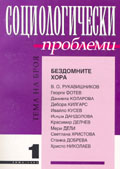Модерност и религиозна идентичност
Modernity and Religious Identity
Author(s): Georgi FotevSubject(s): Social Sciences
Published by: Институт по философия и социология при БАН
Summary/Abstract: Regardless of the way according to which the different religions examine society, each one of them is thinkable as a social phenomenon and is of key significance for the meaningful constitution of the social world. The religious-sacral is in opposition to the profane, to the everyday and the social-transitional but each religion takes part in making the history of society and in practice it has its own history, inseparable from it. Each religion fulfils social-integrating functions but at the same time the "other" religion has the natural status of the "alien" religion and makes the "other" social world in one degree or another more or less opaque. Religion in its social life tends to defend theonomy but it cannot achieve the complete elimination of the autonomy. The secularization of the world which is an internal element of modernity leads to restriction of theonomy and is connected with the domination of autonomy. The periodical crises of modernity are in the end an expression of the lack of potentials of modernity in finding an alternative decision of the highest values of religion. Constrained atheism and modernity result in religious mobilization in search of a \vay out of the fragmented society, against the weakness of the secularized forms of social solidarity. The appearance of different forms of religious fundamentalism is an expression not only of a crisis of traditional religions but of a crisis of modernity.
Journal: Социологически проблеми
- Issue Year: 27/1995
- Issue No: 1
- Page Range: 103-122
- Page Count: 20
- Language: Bulgarian
- Content File-PDF

